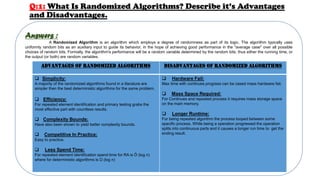Topic 1.4: Randomized Algorithms
- 1. Chapter Name: Introduction To Algorithm Topic 1.4 : Randomized Algorithms Project Prepared By: KM Bappi CSE 2006-2007
- 2. Q:1: What Is Randomized Algorithms? Describe itŌĆÖs Advantages and Disadvantages. Answers : A Randomized Algorithm is an algorithm which employs a degree of randomness as part of its logic. The algorithm typically uses uniformly random bits as an auxiliary input to guide its behavior, in the hope of achieving good performance in the "average case" over all possible choices of random bits. Formally, the algorithm's performance will be a random variable determined by the random bits; thus either the running time, or the output (or both) are random variables. Advantages of Randomized Algorithms Disadvantages of Randomized Algorithms ’ü▒ Simplicity: A majority of the randomized algorithms found in a literature are simpler then the best deterministic algorithms for the same problem. ’ü▒ Efficiency: For repeated element identification and primary testing grabs the most effective part with countless results. ’ü▒ Complexity Bounds: Have also been shown to yield better complexity bounds. ’ü▒ Competitive In Practice: Easy to practice. ’ü▒ Less Spend Time: For repeated element identification spend time for RA is Ūæ (log n) where for deterministic algorithms is ╬® (log n) ’ü▒ Hardware Fail: Max time with continues progress can be cased mass hardware fail. ’ü▒ Mass Space Required: For Continues and repeated process it requires mass storage space on the main memory. ’ü▒ Longer Runtime: For being repeated algorithm the process looped between some specific process. While being a operation progressed the operation splits into continuous parts and it causes a longer run time to get the ending result.


